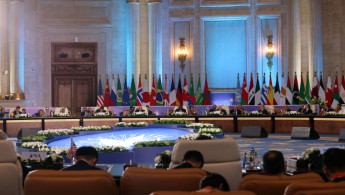Egypt summit sees Arab states slam attempts to 'justify' killing of Palestinians
A Cairo peace summit on the war in Gaza ended without countries agreeing a joint statement on Saturday, highlighting a significant gulf between Arab and Western states.
Arab diplomats told AFP that Western delegates demanded "a clear condemnation placing responsibility for the escalation on Hamas" but Arab leaders refused.
Egypt's presidency instead released a statement (AR) – drafted with the approval of Arab attendees, according to the diplomats – saying the war had "revealed a shortcoming in the values of the international community in addressing crises".
"While we see a rush and competition to quickly condemn the killing of innocent people in one place, we find an incomprehensible hesitation to condemn the same act in another," the statement added.
"We even find attempts to justify this killing, as if the life of a Palestinian human being is less important than the lives of other people."
The gulf between Arab and Western states comes amid widespread pro-Palestinian protests across the Middle East and North Africa.
7 October
Israel has been occupying Palestinian territory for decades and the ongoing fighting in Gaza is one in a line of escalations to hit the strip.
The latest war in Gaza was sparked on 7 October when Hamas and other Palestinian fighters stormed out of the besieged enclave to perform a surprise attack inside Israel, killing 1,400 people.
Israel has since waged a bombing campaign against Gaza, killing over 4,650 people. It has also tightened its years-long blockade, leading to shortages of basic supplies.
Responding to the summit that took place in Egypt, the Israeli foreign ministry said in a statement that 7 October was a "wakeup call to the world to fight terrorism together".
"The Islamist terror threat does not only endanger Israel, it endangers the states of the region and the whole world," the ministry added.
"It is unfortunate that even when faced with those horrific atrocities, there were some who had difficulty condemning terrorism or acknowledging the danger."
International law
But Jordan's King Abdullah accused neighbouring Israel of violating international law in a speech at the peace conference, delivered in English and addressed to attendees from Europe and the world.
"The relentless bombing campaign underway in Gaza, as we speak, is cruel and unconscionable on every level," he said.
"It is collective punishment of a besieged and helpless people. It is a flagrant violation of international humanitarian law. It is a war crime."
King Abdullah also said the forced or internal displacement of the Palestinians "is a war crime according to international law, and a red line for all of us".
It comes after Jordan and other Arab countries held Israel responsible for a deadly blast that hit Gaza's Al-Ahli Arab Baptist Hospital on Tuesday. The Israelis blame the Palestinian Islamic Jihad group.
Jordan, home to over two million Palestinian refugees, normalised ties with Israel in 1994. Amman is considered an important US ally in the Middle East, making the monarch's intervention significant.
Abraham Accords
The ruler of Bahrain, which agreed to normalise relations with Israel in 2020 as part of the controversial US-brokered Abraham Accords, also rejected displacement at the Cairo summit.
King Hamad bin Isa Al Khalifa said: "We assert our absolute refusal of the displacement of Gazans from their land and the land of their ancestors."
He refrained from blaming either Palestinian militant groups or Israel.
King Hamad called for diplomatic efforts to secure the "release of all hostages and detainees, [and] facilitate the entry of medical aid, food, water, fuel and electricity to the Gaza Strip in line with international humanitarian law".
An initial aid convoy reached Gaza from Egypt on Saturday, shortly before the Cairo summit opened, with a second entering the international crossing at Rafah on Sunday. The humanitarian situation remains extremely difficult.
An Israeli army spokesperson on Sunday said Israel had confirmed that 212 people are being held captive in Gaza.
Abdel Fattah al-Sisi, president of host country Egypt, said Cairo "condemns, in the clearest terms, the targeting, killing and intimidation of peaceful civilians".
"At the same time, Egypt is expressing its deep shock that the world is standing by idly, while the catastrophic humanitarian crisis unfolds," he added.
"Two and a half million Palestinians in the Gaza Strip are being subjected to collective punishment," he said. Collective punishment is a war crime.
Hamas
None of King Abdullah, King Hamad, Sisi, and Saudi Foreign Minister Prince Faisal bin Farhan used the word "Hamas" in their speeches.
But UK Foreign Secretary James Cleverly pointed the finger straight at the Palestinian militants.
Cleverly expressed "revulsion at Hamas's murderous acts of terrorism", saying the lives Gazan civilians had been made "harder, more painful and more dangerous" because of the group's 7 October attack.
He said he had spoken to Israel's government about its duty to respect international law and had called for restraint from the country's army.
German Foreign Minister Annalena Baerbock also put the blame on Hamas.
Spanish Prime Minister Pedro Sánchez said his country "strongly condemns the terrorist attacks perpetrated against Israel" and recognises its "right to defend itself in… strict compliance with international law and international humanitarian law".
He added that Hamas must immediately and unconditionally release all hostages.
The United States, Israel's closest ally, only sent its Cairo chargé d'affaires, who did not address the meeting in public.
AFP and Reuters contributed to this report.





 Follow the Middle East's top stories in English at The New Arab on Google News
Follow the Middle East's top stories in English at The New Arab on Google News


